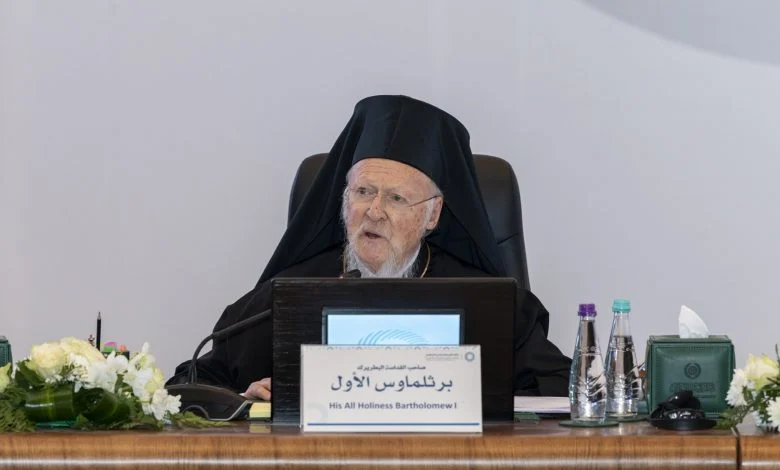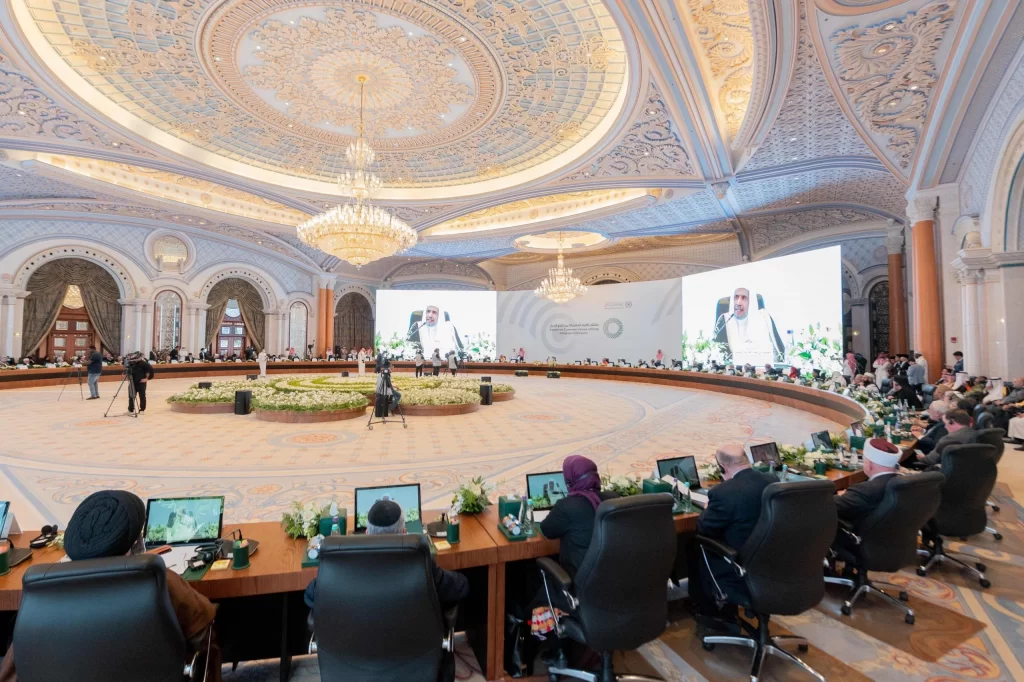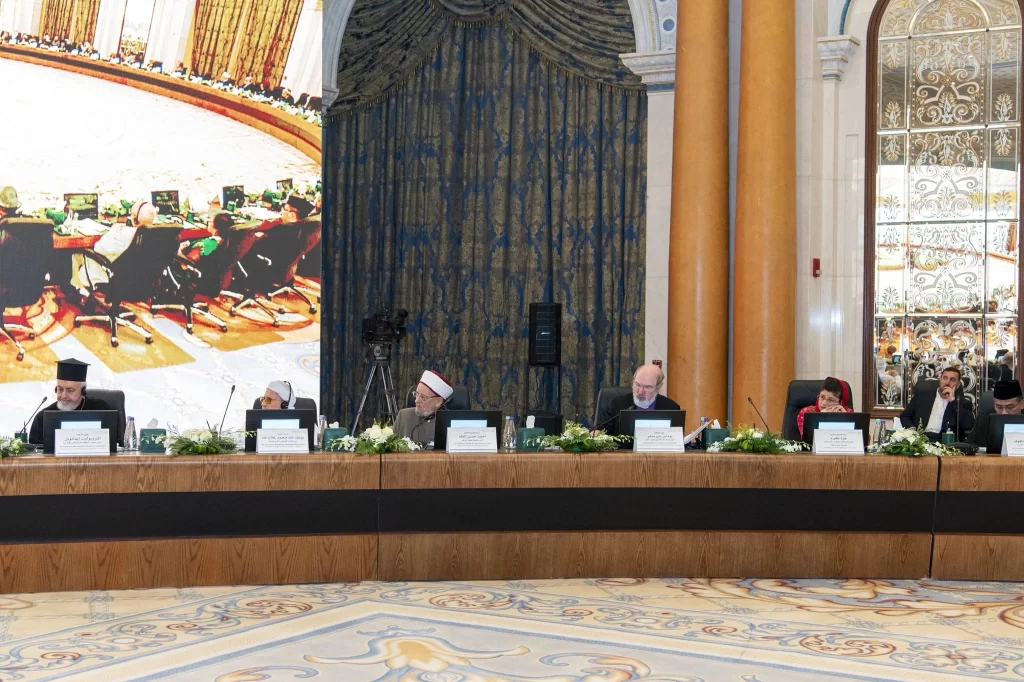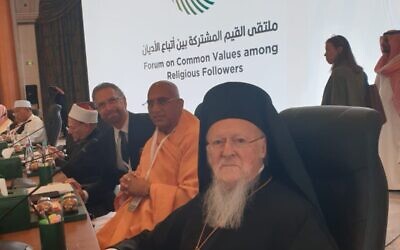Η Α.Θ.Παναγιότης, ο Οικουμενικός Πατριάρχης κ.κ. Βαρθολομαίος απευθύνθηκε σήμερα, Τετάρτη, 11 Μαΐου 2022, στη “Συνάντηση για την Προώθηση Κοινών Αξιών μεταξύ των πιστών των Θρησκειών”, ένα διεθνές Συνέδριο που διεξάγεται στην πρωτεύουσα της Σαουδικής Αραβίας, το Ριάντ.
Ο Παναγιώτατος υπενθύμισε εισαγωγικά ότι το όνομα του Οικουμενικού Πατριαρχείου είναι αφιερωμένο στον διάλογο και στην προσέγγιση των θρησκειών, των πολιτισμών και των λαών, χτίζοντας γέφυρες μεταξύ τους και μεταξύ της ανθρωπότητας και του φυσικού περιβάλλοντος. Παράλληλα το Οικουμενικό Πατριαρχείο εργάζεται για την προώθηση της ειρήνης και της αλληλεγγύης παγκοσμίως, με σκοπό την προστασία της ανθρώπινης αξιοπρέπειας. Εξάλλου, το Οικουμενικό Πατριαρχείο, όπως επισήμανε ο Πατριάρχης, έχει ξεκινήσει διαθρησκευτικούς διαλόγους μεταξύ των τριών μονοθεϊστικών θρησκειών και έχει καλλιεργήσει άλλα διαθρησκευτικά έργα. «Συνεχίζουμε αυτές τις προσπάθειες με ειλικρίνεια και αυτοπεποίθηση».
Στη συνέχεια, ο Παναγιώτατος αναφέρθηκε στον ρόλο που έχει διαδραματίσει η θρησκεία στην ανθρωπότητα διαχρονικά, ενώ υπογράμμισε ότι στον πυρήνα της αποστολής της θρησκείας βρίσκεται η ειρήνη. Επισήμανε την ανάγκη συνεργασίας όλων για την προάσπιση της ειρήνης και της συμφιλίωσης, δεδομένων των τεράστιων σύγχρονων προκλήσεων, και εκτίμησε ότι ο καταλληλότερος τρόπος για να επιτευχθεί αυτό, είναι ο ειλικρινής διαθρησκευτικός διάλογος και ο αλληλοσεβασμός. Παρέθεσε, εξάλλου, σχετικό απόσπασμα από τις αποφάσεις της Αγίας και Μεγάλης Συνόδου της Ορθοδόξου Εκκλησίας, που πραγματοποιήθηκε στην Κρήτη το 2016.

Σε άλλο σημείο ο Παναγιώτατος τόνισε πως ο διάλογος και η ειλικρίνεια είναι τα αντίδοτα του φονταμενταλισμού, ενώ έκανε ειδική μνεία στην προστασία του φυσικού περιβάλλοντος και στην προώθηση της κουλτούρας της αλληλεγγύης, δύο ζητήματα που έχει προτάξει με ζέση ο ίδιος κατά τη διάρκεια της Πατριαρχίας του.
Καταλήγοντας, ο Οικουμενικός υπογράμμισε ότι κανείς δεν μπορεί μόνος του να αντιμετωπίσει τα σύγχρονα προβλήματα, είτε πρόκειται για ένα έθνος, ένα κράτος, μια θρησκεία, την επιστήμη ή την τεχνολογία. «Χρειαζόμαστε κοινή ευθύνη, κοινή κινητοποίηση, κοινές προσπάθειες και κοινούς στόχους», ξεκαθάρισε, για να συμπληρώσει ότι «χρειαζόμαστε πραγματικά ο ένας τον άλλον». «Οι μελλοντικές γενιές δικαιούνται μια ζωή με αξιοπρέπεια, έναν κόσμο απαλλαγμένο από μίσος και βία, αμόλυντο από τη μόλυνση και τη φυσική καταστροφή, μια κοινωνία ειρήνης και αδελφότητας», επισήμανε, μεταξύ άλλων, ενώ δεν παρέλειψε να αναφερθεί στον εξελισσόμενο πόλεμο στην Ουκρανία, απευθύνοντας έκκληση προς τις αρμόδιες ηγεσίες και τους διεθνείς οργανισμούς, καθώς και σε όλους τους ανθρώπους καλής θελήσεως, να αγωνιστούν για τη λήξη όλων των εχθροπραξιών και την επικράτηση μιας δίκαιης και βιώσιμης ειρήνης.

Ακολουθεί η ομιλία του Παναγιωτάτου:
Your Excellencies,
Esteemed religious leaders,
Ladies and gentlemen,
It is a great joy and a unique privilege to address this distinguished gathering here at the Forum for Promoting Common Values among the Followers of Religions in Riyadh, Saudi Arabia on the kind invitation of His Excellency Sheikh Muhammad Al-Issa, Secretary-General of the Muslim World League.
We speak in the name of the Ecumenical Patriarchate, which is devoted to dialogue and rapprochement, building bridges between diverse faiths, cultures and peoples, between humanity and the natural environment, as well as promoting peace and solidarity worldwide, for the sake of the protection of human dignity. The Ecumenical Patriarchate has initiated interfaith dialogues between the three monotheistic religions and has cultivated other interreligious projects. We continue these efforts with sincerity and confidence.
It is impossible to understand the past, analyze the present, or imagine the future of humanity without referring to the role of religion. Religion is not only connected with the deep concerns of the human being; it is also related to the identity of peoples and civilizations. Religion has created and preserved the greatest cultural achievements of humankind, essential moral values, respect for human dignity and the integrity of creation. Our sacred texts include precious anthropological knowledge. Religion is the arc of wisdom and the spiritual inheritance of humanity. Culture has, in general, the impact of religion.
Another essential function of religion is peacemaking. In our times, the credibility of religions largely depends on their commitment to peace. Peace does not result automatically from economic and cultural development, from the progress of science and technology, or from high living standards. It is always a duty, it requires vision, commitment, struggle, sacrifice and patience. We believe that there are potential and inexhaustible reserves of peacemaking in the great religious traditions. Yet, the potential is not enough. We have to implement and cooperate for peace; we have to become effective factors in human progress.
“The Orthodox Church considers it is her duty to encourage all that which genuinely serves the cause of peace and paves the way to justice, fraternity, true freedom, and mutual love among…all peoples who make up the one human family. She suffers with all people who in various parts of the world are deprived of the benefits of peace and justice.” Given the tremendous contemporary challenges, the most appropriate way to peace and reconciliation is sincere interreligious dialogue and mutual respect. As the Holy and Great Council of the Orthodox Church (Crete, 2016) stated: “Honest interfaith dialogue contributes to the development of mutual trust and to the promotion of peace and reconciliation.”

Thus, we can realize the gravity of the error of those modern thinkers who underestimated the religious phenomenon, the fault of those who were blind in front of the dynamism of religion, of the culture it created, of its contribution to peace and its enormous social impact. Progressive intellectuals are, in a way, accused of having indirectly strengthened fundamentalist excesses in religion since they downgraded religious faith and practices. Fundamentalist explosions are often reactions to an offence of faith. Dialogue and openness are the antidotes to fundamentalism. Openness to the “other” does not threaten our particular identity. On the contrary, it deepens and enriches it.
Two of the most passionate concerns during our ministry as Ecumenical Patriarch have been protecting the natural environment and fostering a culture of solidarity. We believe that the ecological crisis reflects an anthropological impasse, the spiritual crisis of contemporary man and contradictions of his rationalism, and the arrogance of his knowledge and technology. This approach cannot only contribute to discovering hidden dimensions of the ecological problem but also reveals new possibilities to face and overcome it.
Solidarity is the core of our vision of a just and sustainable world. This notion dynamically expresses the social and political dimension of “fraternity” and, at the same time, promotes the shared responsibility of all human beings to work for the common good. On the other hand, solidarity refers to the unconditional love and support of our fellow humans in need, irrespective of any political and social conditions.
Nobody – not a nation, a state, religion, science or technology – can face our problems alone. Our future is shared, and the way toward this future is a mutual journey. We need common responsibility, common mobilization, common efforts, and common goals; we truly need one another. We are always closer to one another in more ways than we are distant from or different from one another. We firmly reject the theory of the inevitable “clash of civilizations.” Building bridges between faiths, bridges with nature, and promoting a culture of peace and solidarity are responsibilities that we owe not only to the present generation. Future generations are entitled to a life in dignity, to a world free of hatred and violence, unspoiled by pollution and natural devastation, a society of peace and fraternity. At these crucial moments that the world is experiencing following the war in Ukraine, we appeal to the responsible authorities and international organizations and all people of goodwill to strive for the end of all hostilities and the establishment of just and sustainable peace.
In all these efforts, we need the spiritual strength and contribution of religions. Their traditions are an inexhaustible source of crucial truths for human beings and the world, for our relation to God, to ourselves, to others and to creation, for our freedom, for the meaning of life and the final destination of all. True faith does not release us from our responsibility to the world. On the contrary, it strengthens us to give witness to our hope.
In this spirit, we express our wholehearted gratitude for this invitation and this encounter, and we wish you all good health and every blessing from Above.
Thank you for your kind attention!

